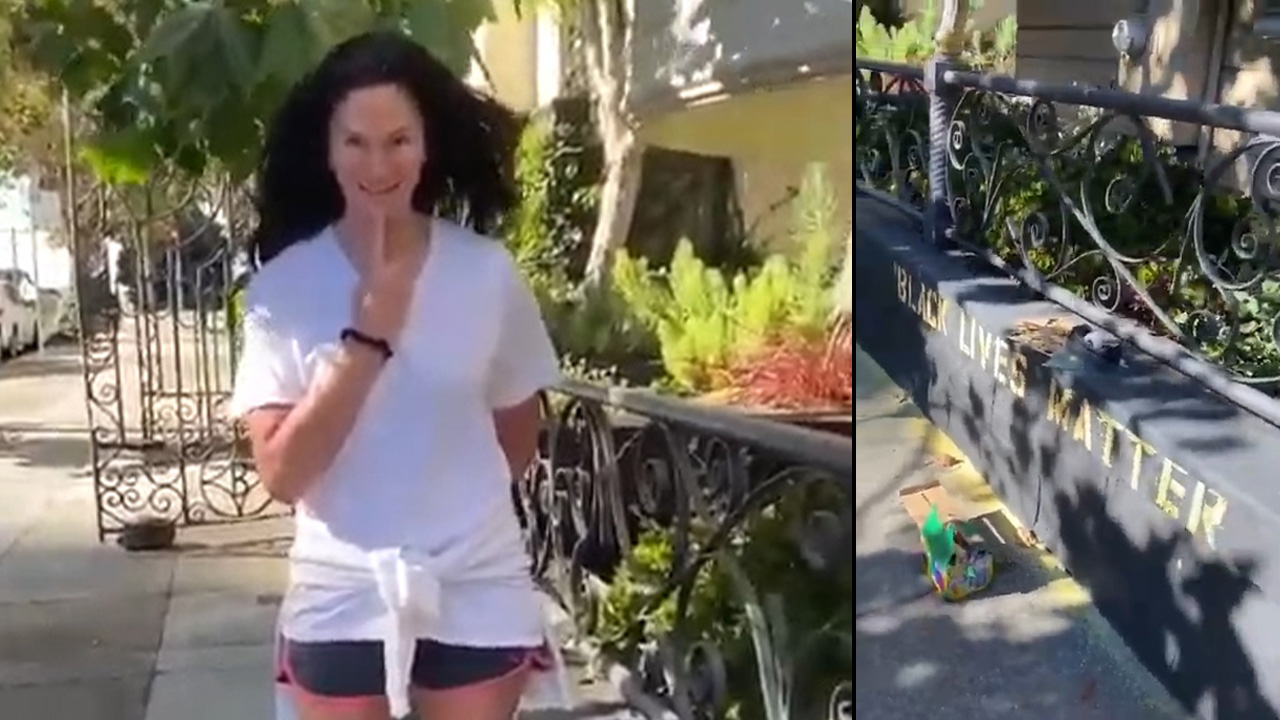Karens
San Fran Karen: Laface Skincare CEO Apologizes For Confrontation

Viral Confrontation Sparks Outrage
A video of LaFace Skincare CEO Lisa Alexander and Filipino resident James Juanillo fighting in Pacific Heights, San Francisco, has gone viral, prompting controversy. When the incident began, Juanillo was calmly chalking a Black Lives Matter sign in his yard. Alexander and her walking companion challenge Juanillo’s right to remain on his property, prompting a police call in the viral video.
A white couple call the police on me, a person of color, for stencilling a #BLM chalk message on my own front retaining wall. “Karen” lies and says she knows that I don’t live in my own house, because she knows the person who lives here. #blacklivesmatter pic.twitter.com/rOpHvKVwgP
— James Juanillo (@jaimetoons) June 12, 2020
Laface Skincare CEO Lisa Alexander Apologizes
LaFace Skincare CEO Lisa Alexander apologized on Sunday after the outrage. She apologized for her impolite actions and acknowledged being uninformed of racial inequality’s harm. Alexander said her actions were racist and promised to examine racial privilege. The apology directly accepted Mr. Juanillo and expressed a willingness to meet him for a discourse, showing a commitment to learning and personal development from the event.
Industry Reaction To Business Fallout
LaFace Skincare pulled its website down, and Birchbox broke connections with Lisa Alexander following the event, criticizing her conduct. The Birchbox move highlights how social media affects company choices and the growing need for responsibility in today’s linked society. The event highlights corporate accountability concerns and how people’s behaviors, even outside of work, affect their organizations.
Understanding Racial Profiling’s Effect
The Lisa Alexander and James Juanillo incident shows how widespread racial profiling and social prejudices are. The confrontation by Alexander and her partner constituted apparent prejudice against Juanillo, a longtime Pacific Heights resident. Calling the police for putting a Black Lives Matter sign on his property shows the abuse of power and highlights the deep-rooted stereotypes people of color endure. The event shows that even in progressive and wealthy communities, racial profiling is prevalent and destructive, requiring ongoing awareness and education.
Read Also: Uncovering Five Years Looking Back At BBQ Becky Karen
Juanillo, a proud homosexual Filipino, has freely discussed his fear and persecution, underlining that this is not an isolated incident. He knew many of the area police officers, yet they did nothing when they arrived, raising doubts about the legitimacy and implications of such calls based on racial preconceptions. This event sparks discussions about systemic reform, unconscious bias education, and creating a more inclusive and accepting society.
Catalyzing Change Using Social Media
The virality of the video on social media heightened the situation and highlighted racial injustice. The immediate and widespread criticism of Lisa Alexander’s behavior shows social media’s capacity to hold people and organizations responsible. James Juanillo’s @jaimetoons video went viral, sparking outrage and calls for responsibility.
The Alexander and Juanillo incident emphasizes the power of social media for justice and change. It reminds people that they may now record and share injustice, uniting against prejudice. Birchbox’s decision to break relations with LaFace Skincare shows how social media can influence public opinion and business choices. Collective activism and holding people responsible may lead to sound change.
Corporate Accountability After Controversy
After apologizing, Birchbox cut connections with LaFace Skincare to protest racial prejudice. Consumers want corporations to share their beliefs; thus, corporate responsibility is becoming a social issue. Birchbox’s separation from LaFace Skincare shows the real-world implications of dealing with people who violate social norms.
This episode calls into question whether organizations should evaluate and handle leadership conduct. Businesses must reconcile personal and professional behavior as customers grow increasingly socially aware. Birchbox’s fast move shows how public opinion increasingly affects company choices, stressing the necessity of corporations fighting prejudice and working toward a more egalitarian and inclusive society.
Community Responses And Dialogue Requests
After the event, Pacific Heights has become a hub for talks about racism, privilege, and open communication. James Juanillo’s invitation to drink coffee with Lisa Alexander suggests reconciliation. Online and offline community members have discussed the occurrence, with some expressing astonishment and disappointment and others using it to combat racial inequality.
The experience has made locals realize the value of communal togetherness and accountability. As people seek to transform this event into constructive change, calls for community-led initiatives, educational programs, and open forums are growing. Juanillo’s readiness to talk shows that human ties and understanding may break prejudices and create a more inclusive community.
Learning From Experience And Personal Growth
Lisa Alexander’s public apology admits her ignorance and emphasizes self-reflection and improvement. Her desire to comprehend white privilege shows a willingness to learn. Influential people may set an example by accepting their errors and working to better themselves and society in a culture where accountability is more important.
The encounter sparks Alexander’s self-discovery and education on racial inequality. It emphasizes that everyone is open to self-examination, and learning may develop and change. Alexander’s willingness to meet with James Juanillo highlights the possibility of personal forgiveness and the power of discussion to bridge divides.
Significant Impacts On Social Justice Movements
The San Francisco event between Lisa Alexander and James Juanillo raises questions about how people and companies fund social justice initiatives. The incident highlights microaggressions and structural inequalities in daily life as part of a worldwide discourse on racial equality. It shows that even simple gestures like stenciling a Black Lives Matter symbol may spark talks about prejudice and privilege.
The event shows that social justice needs ongoing work at all levels. Personal actions and social change are intertwined. Thus, people, communities, and corporations must actively work to end discrimination. As social justice movements gather pace, incidences like this emphasize the significance of tackling fundamental causes, fostering knowledge, empathy, and a dedication to a more fair and equitable society.












You must be logged in to post a comment Login